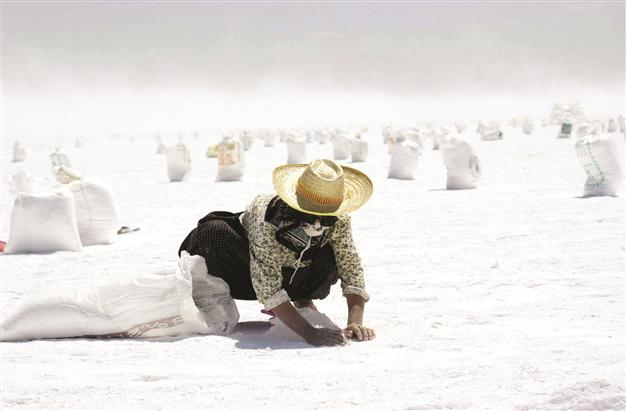Turkey, China ink gas storage deal
ANKARA – Hürriyet Daily News

This file photo shows a worker collecting salt over the hyper-saline Lake Tuz. The government plans to deposit natural gas under the lake
Turkey’s state-run pipeline company BOTAŞ and China’s Tianchen Engineering (TCC) have signed a $559 million deal to build a 1 billion-cubic-meter gas depository under Turkey’s Lake Tuz in Central Anatolia.
Energy-hungry Turkey is keen on building the gas depository because of current reliance on Russia, Azerbaijan and Iran for natural gas.
Turkey’s Energy Minister Taner Yıldız said Turkey’s gas demand is increasing more and more each day and this project is needed to ensure the healthy management of natural gas.
“We are planning on building depositories in other regions as well. Turkey’s total natural gas capacity is supposed to be 6 million-cubic-meters, so we are contemplating new investments,” Yıldız said during a ceremony in Ankara to mark the agreement, Reuters reported.
The 6 million-cubic-meters Turkey needs are equivalent to the amount of gas BOTAŞ has been importing via the West Line from Russian Gazprom on an annual basis. However, BOTAŞ has canceled the current deal with Gazprom upon a price dispute. The domestic natural gas market now awaits new Gazprom contracts to be signed by international and Turkish firms to replace BOTAŞ.
The country’s underground depository does not currently have the sufficient means to provide gas in the event of a disruption to the gas flow, top Turkish officials said earlier.
With this depository and the 2.6 billion-cubic-meter facility in Silivri, in Turkey’s Marmara region, Turkey’s gas deposits would reach 3.6 million cubic meters, according to Anatolia news agency.
The first phase of the depository is projected to be completed by 2019. The depository’s first six wells are expected to be ready by 2016 and the remaining six by 2019, according to official data.
This would boost the depository’s reserves to one billion-cubic-meters. The depository will also hold an extra 500 million-cubic-meters in reserves
















